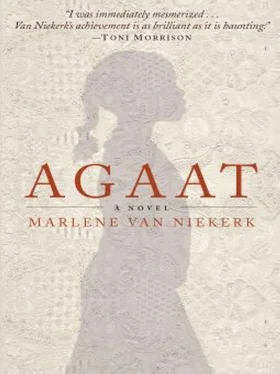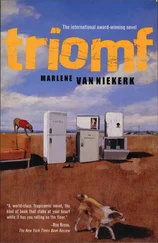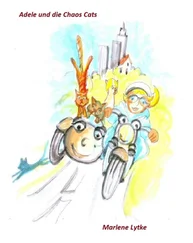There’s only one creak as she sits up on the camp stretcher. While the chimes echo in the front room, she doesn’t budge. What could she be thinking of in between the five strokes? Would she be steeling herself there on her bed, looking down the dark passage with the first light falling from the rooms, from door frame to door frame? Would she be swiftly running through her schedule for the day? Praying perhaps? No, Agaat doesn’t pray, she only prays on my behalf, she says, that will have to suffice.
At the beginning of winter she carried in the stretcher for the first time from the storeroom. Too flimsy for her to my mind, she’s filled out these last few years. Since she’s been looking after me she no longer works so much around the house and in the garden. Dig here, scrub there, I hear her handing out orders.
At night I don’t hear her stir. She sleeps like a ramrod on that bier. I can see it before me. On her back with the hands on the chest. The sleep of the vigilant. Twice a night, once before midnight and once after, she comes and stands by my bed in the dark on bare feet. She is not officially awake. Nor am I, I pretend to be asleep. Sometimes of late she then goes out at the back and stays away for an hour or longer.
I don’t hear her go into the back room. Where on earth would she roam?
There’s the first stirring now. The stretcher creaks as she stretches to reach the switch of the passage light. She takes one gulp of water from her mug. The enamel krrts on the floor as she sets it down. Another creak as she swings her legs off the little bed. A swish as she puts on her housecoat over her nightdress. A squeak and a bang as she folds the stretcher, a shuffling as she slides it into the second broom-cupboard next to the bathroom.
She walks down the passage. Thud, thud, thud, go her bare feet on the boards. She unlocks the kitchen door, talks to the dogs, closes the lower door behind her again. The screen door squeaks, the screen door slams, seven paces, the outside room’s door is opened, the lock, the bolt, the lower door that scuffs on the linoleum. Washing and dressing is what she’s going to do. Use the bathroom in the house, I try to get through to her, but she pretends not to understand me.
Koffie and Boela make whimpering sounds. I hear them paw the lower door of the kitchen. She no longer allows them in my room. On Leroux’s advice, she says.
I don’t believe her. From the day that she started to read from the booklets, she forbade them here. As if she wanted to be the dog herself.
She cannot abide to see other life in my room.
Just as little as she can abide the idea of moving into the guest bedroom and to stay in the house decently with me. Why not? There’s more than enough space here, I gesture, but there’s no getting her to understand.
I miss the dogs. Always when they came galloping in here, I felt as if I was still somebody’s owner. First with the front paws on the bed’s edge, wet muzzles pressed in under my hands, smell of dog bodies in my nose, laughing mouths and panting breaths, a whole warm brown fur-covered life here over my white covers. With their wag-tails they whisked the air into life here in the room in the mornings. After a while they would calm down and settle on the little mat by the glass door next to Agaat’s chair, and I would look at how their eyebrows twitched as they watched me for a while and how they at length would sigh and go to sleep. I could watch them like that until they started dreaming, till the hind legs started kick-kicking, and the little muscle started twitching in the forepaw and the lip started quivering with a muted growl. Chasing rabbits.
Now it’s only Agaat’s chair there in front of the glass door. There she sits and embroiders during the day if she has time, if she feels well-disposed towards me, and in the evenings until I fall asleep.
It’s a big cloth. She’s been working at it ever since I’ve not been able to move, all of eleven months. Started it a long time ago, it seems, because one side had already been thoroughly worked when she brought it in here the first time. I often signal with my eyes, let’s have a look, but she pretends not to see. Now the first light darts through the chink in the curtain onto the embroidered cloth where she put it down on her chair. The decoration is dense and thick in white satin thread, an intricate combination of drawn stitch and shadow stitch. If I focus in a certain way, the strip on which the light falls looks like a band of white marble with convoluted detail sculpted in low relief.
She’s made great strides with the embroidery, Agaat, she’d by now be able to add a few chapters to the embroidery book.
Quarter past five, it chimes. She’s back in the kitchen where she put the kettle on on her way out, so that now she only has to add boiling water to the bag and the thickening agent. Here she is coming down the passage. First tray, set out last night, second quarter-hour of the day. Tea. Morning medicine.
With her smell of Lifebuoy and Mum and calamine she enters the room.
Praise the Lord, rise up rejoicing, she sings. She stops when she sees I’m already awake.
Her uniform crackles. Her cap shines like a beacon. She is wearing a clean white housecoat with short sleeves, over that a white crocheted jersey. I can smell the cold-water Omo. The apron is stiff with starch. Her rubber soles sough as she tacks about my bed.
She cranks me up, she pummels my pillows, she hoists my neck out of my body, she props up my head, she arrays me.
Wake and shake, make and take, she says.
She comes with a wet lukewarm sponge and wipes out my mouth.
Mole from the mouth, she says.
She unfastens the nappy between my legs, puts it aside in a bundle and slides the number one pan in under me.
She puts on my bib.
She clamps the jug with the long spout and the little tube to the railing of the bed. She bends the drip-stem with the mouthpiece so that it’s suspended above my lips. She adjusts the drip-hole. She puts the mouthpiece into my mouth.
Ten counts between each swallow, she says. Ready steady go!
She eases open the valve. The first drop of warm thickened liquid spreads over my tongue. Rooibos. One mouthful tea and one mouthful breath and count to ten, says Agaat, think of the undrprvlgd.
A mouthful of consonants. Lest I forget what I wrote.
I do my best. Half runs down my chin.
She watches me closely while she prepares everything. She tucks the bib in further under my chin. She wipes my chin. I get hold of the rhythm. I am thirsty. I count to ten. I swallow. I count ten tens and ingest ten mouthfuls, a quarter-mouth at a time. This cup.
Agaat fills the plastic basin with hot water from the kettle that she’s brought with her from the kitchen. She arranges the towels, the washcloths, the soap and the sponges, everything neatly on the large hospital trolley that Leroux carted in here.
I drink three more tens.
Drinking merrily she is this morning, says Agaat. Have you peed yet, Ounooi?
I signal, no, you can see for yourself the nappy is dry. She doesn’t look.
I’m asking, have you peed yet?
Now she looks. I signal again no, I have not and don’t be so crude so early in the morning.
Well go on pee, Ounooi, I haven’t got all day.
Don’t look at me, I gesture, look in the other direction.
Agaat makes little whistling sounds between her teeth to encourage me.
It won’t come.
I hear nothing, she says. She puts her hand behind her ear.
Is the little tap stuck this morning, hmmm? Well, perhaps you can’t drink and pee at the same time. Let’s close the tap up here, then maybe the one down there will open.
She keeps her face straight. She closes the tea drip and takes the spout out of my mouth. Her rubber soles suck noisily at the floor, it sounds as if there’s extra torque, extra weight in her tread. I recognise it. That’s what she does when she discovers she can’t make me. She turns her back on me. I know what she’s going to do. She swirls the water around in the washbasin. She wrings out the cloth to make it drip in the water. Still nothing. I know she’s listening. Her ears point backwards. She takes a glass, she pours the water, over and over, from a height.
Читать дальше












